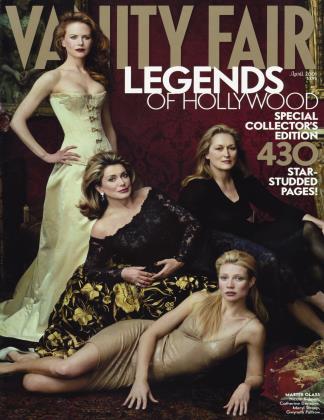Sign In to Your Account
Subscribers have complete access to the archive.
Sign In Not a Subscriber?Join NowHis famous role as the suicide-obsessed Harold opposite Ruth Gordon’s Maude in Harold and Maude indicated the arrival of a bracing new talent, but typecasting, along with his own tendency to turn down parts, caused Bud Cort to fall off the public’s radar screen. With recent roles in Ed Harris’s Pollock and Wim Wenders’ The Million Dollar Hotel, Cort is back, and ready to reveal details about his remarkable Hollywood journey.
George Wayne: In 1971 you starred in what cineasts consider a masterpiece of moviemaking, Harold and Maude. You’ve called the film’s success a blessing and a curse. Why?
Bud Cort: Because it’s all anybody wants to talk about. I’ve made so many films and done so much theater since, and it’s just one of those parts that’s so identifiable that it’s hard to lose that identity no matter what I do.
G.W. Why does it continue to resonate?
B.C. There are so many important life issues addressed in it. The right to love, the right to choose whom to love. There is the whole teen-angst thing.
G.W. You say that you and Ruth Gordon almost became the relationship you both portrayed in Harold and Maude.
B.C. During the making of the film, she was very standoffish.
Then, the day my father died, the first call I got was from Ruth, saying, “Let me tell you about the day my father died.” And suddenly we became the characters pretty much that we were in the film. We really became friends the night my father died.
Oddly enough, he died waiting for me to show up on This Is Your Life, Ruth Gordon.
G.W. Are there days when you feel like a washed-up Hollywood hasbeen?
B.C. Sweetheart, I’ve never been busier in my life. You know how many films I have coming out?
G.W. Anyone who hasn’t seen you in a movie since Harold and Maude would be hard-pressed to recognize you in one of your latest films, The Million Dollar Hotel. Did you have to pay Wim Wenders to put you in this film?
B.C. Did I have to pay him? Wim is a genius and I wanted to work with Wim. He called my agent and told him he wanted me to be in that. I’m really trying not to turn down that much these days. For example, Pollock— I’ve always admired Ed Harris, and he showed me a portrait of that character and I looked exactly like him, but only if I would put on 100 pounds, which I proceeded to do.
G.W. How did you end up living with Groucho Marx?
B.C. One day, through our mutual friend, Erin Fleming, I got invited to a party at Groucho’s. I took a cab up there, and the second my fist connected with the door, there stood Groucho in a beret. Simultaneously we both gasped, and he slammed the door in my face. When the door opened again, Groucho said, “I’m sorry, I thought you were Charles Manson.” [It was just after the murders.] Then it turned out we had the same psychiatrist, and he started dropping these ideas that I should live with Groucho.
G.W. Was Groucho in love with you?
B.C. I used to say he was my fairy godfather. He did love me, and I loved him. I’d sit on his bed in pajamas and watch his old films with him. It was like getting a Fulbright education in comedy.
G.W. There is a famous anecdote about Bud Cort and Groucho’s tooth.
B.C. That’s an amazing story. I had done a film, and Groucho decided he was going to arrange a press premiere for me. That day he had a stroke. I was just beside myself. I went back to the house and Erin came out of his bedroom, and we threw our arms around each other and just sobbed. She said, “Groucho’s got a present for you.” I closed my eyes and opened my hand, and I was holding a tooth. His tooth fell out that afternoon, and he said, “Let’s give this to Bud for good luck for opening night.” I started roaring with laughter, and in the middle of it just started sobbing. She gave me a swig of vodka, a Valium. I took it. I opened my hand to look at the tooth, but was holding the Valium.
G.W. What advice do you give to actors who gain fame at a young age?
B.C. I would say that if you’re typecast, just do it. Don’t turn anything down.
G.W.Thank you, Bud Cort.
 View Full Issue
View Full Issue


















Subscribers have complete access to the archive.
Sign In Not a Subscriber?Join Now